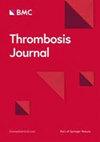Practical approach to thrombocytopenia in patients with sepsis: a narrative review
IF 2.6
4区 医学
Q2 HEMATOLOGY
引用次数: 0
Abstract
Thrombocytopenia frequently occurs in patients with sepsis. Disseminated intravascular coagulation (DIC) may be a possible cause of thrombocytopenia owing to its high prevalence and association with poor outcomes; however, it is important to keep the presence of other diseases in mind in sepsis practice. Thrombotic microangiopathy (TMA), which is characterized by thrombotic thrombocytopenic purpura, Shiga toxin-producing Escherichia coli hemolytic uremic syndrome (HUS), and complement-mediated HUS, is characterized by thrombocytopenia, microangiopathic hemolytic anemia, and organ damage. TMA has become widely recognized in recent years because of the development of specific treatments. Previous studies have reported a remarkably lower prevalence of TMA than DIC; however, its epidemiology is not well defined, and there may be cases in which TMA is not correctly diagnosed, resulting in poor outcomes. Therefore, it is important to differentiate DIC from TMA. Nevertheless, differentiating between DIC and TMA remains a challenge as indicated by previous reports that most patients with TMA can be diagnosed as DIC using the universal coagulation scoring system. Several algorithms to differentiate sepsis-related DIC from TMA have been suggested, contributing to improving the care of septic patients with thrombocytopenia; however, it may be difficult to apply these algorithms to patients with coexisting DIC and TMA, which has recently been reported. This review describes the disease characteristics, including epidemiology, pathophysiology, and treatment, of DIC, TMA, and other diseases with thrombocytopenia and proposes a novel practical approach flow, which is characterized by the initiation of the diagnosis of TMA in parallel with the diagnosis of DIC. This practical flow also refers to the longitudinal diagnosis and treatment flow with TMA in mind and real clinical timeframes. In conclusion, we aim to widely disseminate the results of this review that emphasize the importance of incorporating consideration of TMA in the management of septic DIC. We anticipate that this practical new approach for the diagnostic and treatment flow will lead to the appropriate diagnosis and treatment of complex cases, improve patient outcomes, and generate new epidemiological evidence regarding TMA.脓毒症患者血小板减少的实用方法:叙述性综述
败血症患者经常会出现血小板减少。弥散性血管内凝血(DIC)可能是导致血小板减少的一个原因,因为它发病率高,而且与不良预后有关;但是,在败血症治疗中,必须注意是否存在其他疾病。血栓性微血管病(TMA)是由血栓性血小板减少性紫癜、产志贺毒素大肠杆菌溶血性尿毒症综合征(HUS)和补体介导的溶血性尿毒症综合征引起的,其特征是血小板减少、微血管病性溶血性贫血和器官损伤。近年来,随着特效疗法的发展,TMA 已得到广泛认可。以往的研究报告显示,TMA 的发病率明显低于 DIC;但其流行病学尚未明确,可能存在 TMA 诊断不正确的病例,导致不良后果。因此,区分 DIC 和 TMA 非常重要。尽管如此,区分 DIC 和 TMA 仍是一项挑战,因为之前有报告指出,大多数 TMA 患者可通过通用凝血评分系统诊断为 DIC。目前已提出了几种区分败血症相关 DIC 和 TMA 的算法,有助于改善对血小板减少的败血症患者的护理;然而,将这些算法应用于并存 DIC 和 TMA 的患者可能会有困难,最近就有此类报道。本综述描述了 DIC、TMA 及其他血小板减少疾病的疾病特征,包括流行病学、病理生理学和治疗,并提出了一种新的实用方法流程,其特点是在诊断 DIC 的同时开始诊断 TMA。这一实用流程还指的是考虑到 TMA 和实际临床时限的纵向诊断和治疗流程。总之,我们旨在广泛传播本综述的结果,强调在化脓性 DIC 的治疗中考虑 TMA 的重要性。我们预计,这种实用的诊断和治疗流程新方法将有助于对复杂病例进行适当诊断和治疗,改善患者预后,并产生有关 TMA 的新流行病学证据。
本文章由计算机程序翻译,如有差异,请以英文原文为准。
求助全文
约1分钟内获得全文
求助全文
来源期刊

Thrombosis Journal
Medicine-Hematology
CiteScore
3.80
自引率
3.20%
发文量
69
审稿时长
16 weeks
期刊介绍:
Thrombosis Journal is an open-access journal that publishes original articles on aspects of clinical and basic research, new methodology, case reports and reviews in the areas of thrombosis.
Topics of particular interest include the diagnosis of arterial and venous thrombosis, new antithrombotic treatments, new developments in the understanding, diagnosis and treatments of atherosclerotic vessel disease, relations between haemostasis and vascular disease, hypertension, diabetes, immunology and obesity.
 求助内容:
求助内容: 应助结果提醒方式:
应助结果提醒方式:


